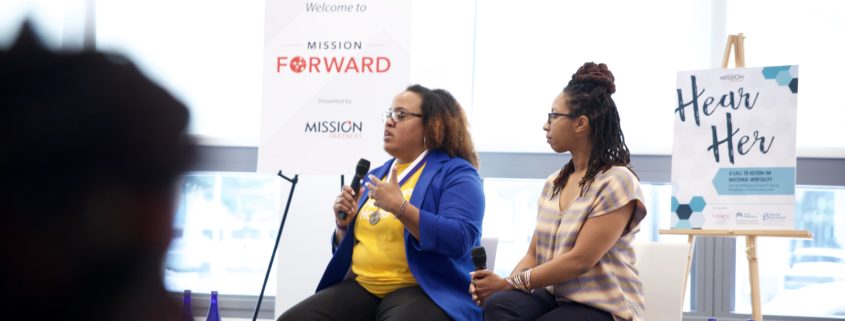Listening and Taking Action on the Black Maternal Health Crisis in the U.S
By Bayonia Marshall and Elena Hilton
Early last week, Mission Partners hosted its 2019 Mission Forward® Spring Reception, Hear Her: A Call To Action on Maternal Mortality. Held at Kaiser Permanente’s Center for Total Health in Washington, D.C., this thought-provoking event featured distinguished speakers who offered a wide range of perspectives on Black maternal health and mortality. Our two panels approached this topic from both a local and national perspective, and we heard from prominent midwives, journalists, doctors, and policy leaders. This gave us all an opportunity to dive deeper into what actions are necessary to make progress toward equity in maternal health as well as our own areas of work.
(On a personal note, Hear Her coincided with Elena’s first day joining the Mission Partners’ team as a new Strategist. “And what an amazing introduction to Mission Partners it was. I was blown away by the expertise of our speakers, and the enthusiasm and thoughtful participation from everyone in the audience was truly wonderful to see.”)
During the first panel of the day, Aza Nedhari, a Certified Professional Midwife, Family Counselor, and the Founding Executive Director of Mamatoto Village, and Ebony Marcelle, Director of Midwifery at Community of Hope/Family Health and Birth Center, spoke with Washington City Paper’s Kayla Randall about how Black women right here in the Washington, D.C. area have been directly affected by policies and a culture that undermine Black women’s authority on their own reproductive and maternal health. The inequities in the city—specifically in Ward 7 and 8—mean women living there often encounter far more barriers when searching for nearby health providers. In those areas specifically, maternity wards have closed leaving people with few accessible options for care. Both Aza and Ebony emphasized how helpful collaboration between OBGYNs, midwives, and doulas can address inequities at all stages of maternal health, and how midwives and doulas should not be seen as luxuries that only wealthy women can access.
One point that really stuck with us was the distinction of how the issue is framed in the United States. Panelist Linda Villarosa, a New York Times Magazine contributor and Director of the Journalism Program at The City College of New York in Harlem, said it clearly: “When I first began [writing on maternal mortality], I thought ‘Oh, it’s about race.’ But [soon learned] it’s not about race. It’s about the impact of racism.” This sentiment was reaffirmed during each discussion throughout the morning. Black women’s voices and concerns are often brushed aside, and healthcare professionals have shown time and time again they don’t always trust Black women to be experts on their own health. By not only acknowledging racism and the disparities in the healthcare system but by taking action, we can help to address the underlying causes for Black maternal mortality and lower the number of preventable deaths in the country.
Along those lines, Dr. Joia Crear-Perry, Founder and President of the National Birth Equity Collaborative, also made an excellent point: “If we’re going to brag about American exceptionalism, we need to do things that are actually exceptional, like supporting healthcare for women and people of color.” Solving this crisis requires not only listening to and amplifying the voices of Black women and supporting Black women-led initiatives, but also advocating for healthcare policies that benefit underserved populations. Ensuring all hospitals accept Medicaid, and that doulas are recognized by each state as a vital part of maternal healthcare, will help make the U.S. a safer place for every pregnant person. Our panelists also encouraged women not to be wary about advocating for themselves. If one doctor isn’t listening to you, find one who will.
For those who were able to join us, we hope you gained as much from these conversations as we did. This is a call to action so we encourage you to not only listen, learn and invest but to take what you learned from Hear Her and apply this knowledge into building safer, healthier, and more inclusive communities where Black women’s voices are centered and lifted up.
If you would like a copy of our Call to Action guide, please email us at [email protected]. We also recommend joining us in this lifetime commitment to anti-racism work by signing up for one of our workshops on equity and racial identity by visiting MissionForward.us.





 Check out our new
Check out our new